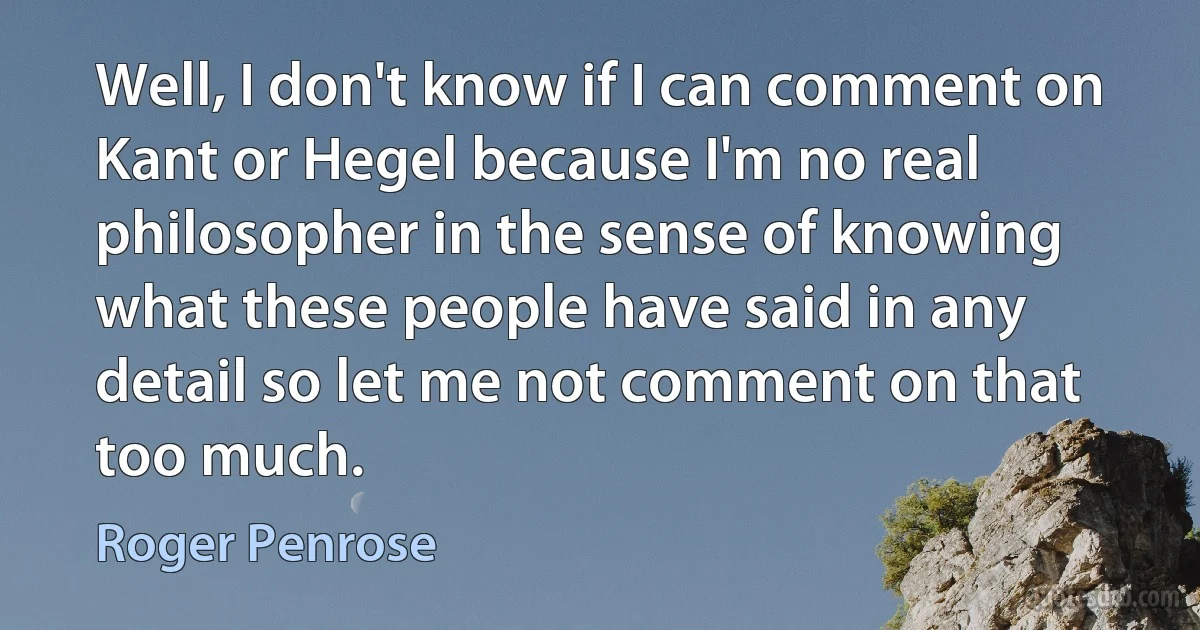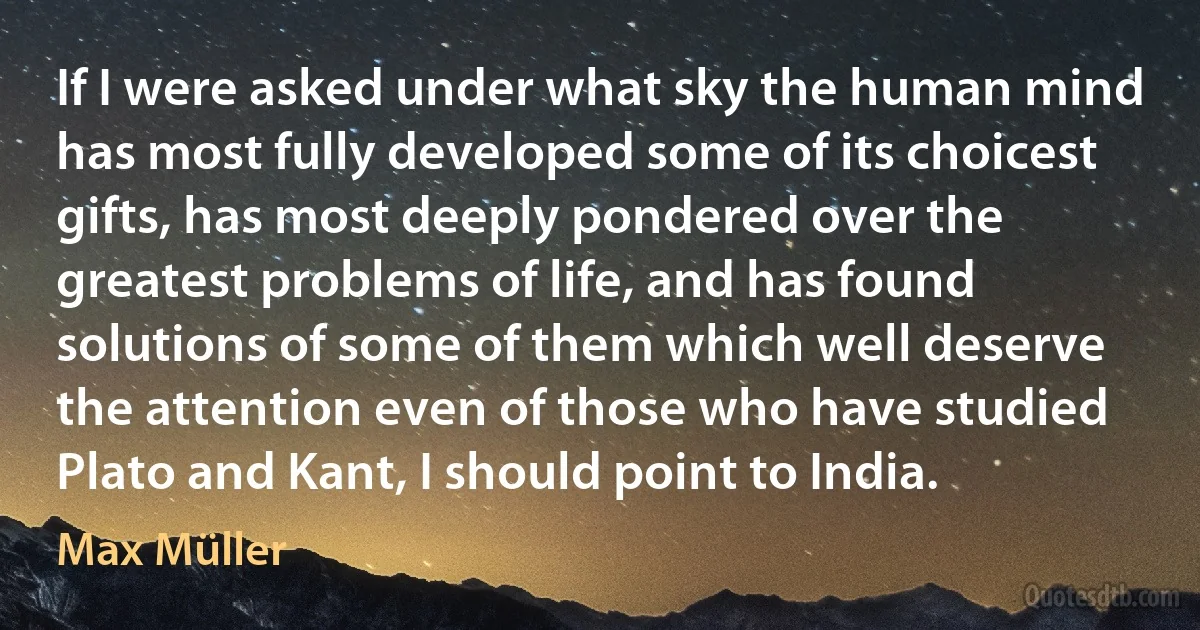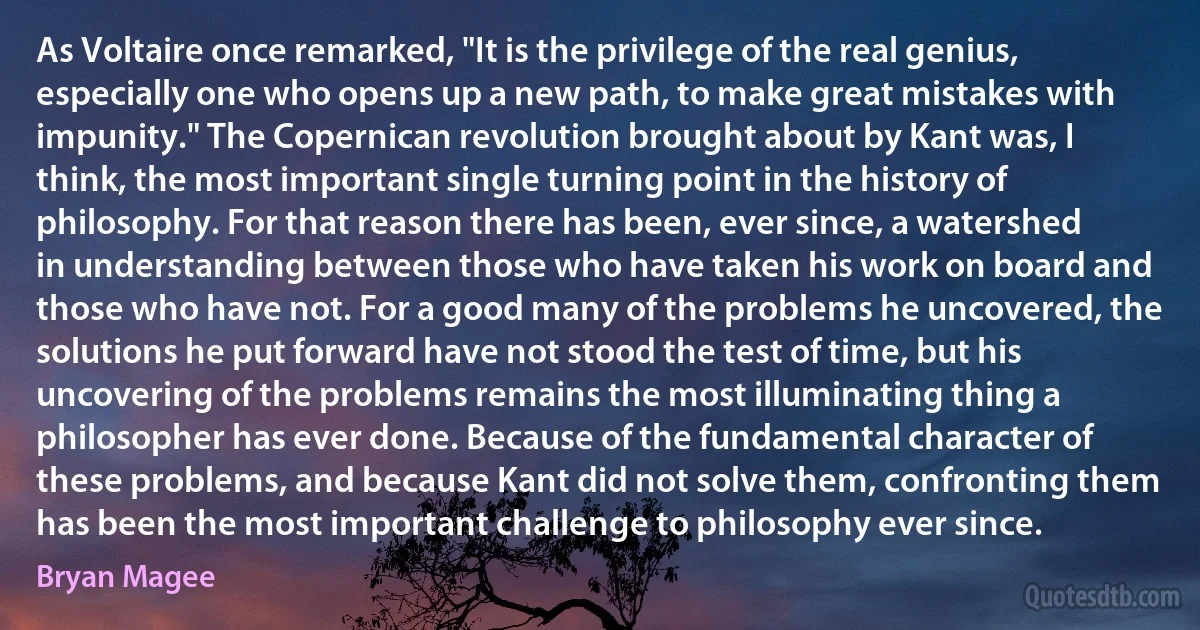Kant Quotes - page 4
Some forms of Kantianism put great weight on "what we can imagine” holding that this can be a source of insight into necessary connections. Thus various of Kant's arguments about space and time depend on the purported fact that it is impossible for us to imagine certain things: we can know, Kant claims, a priori that space has only three dimensions because we cannot imagine it as having more than three dimensions. History in the form of non-Euclidean geometry and modern physics has put paid to that particular line of argument, but in general we should beware of depending too much on "What we can imagine?,” especially in politics. As Nietzsche puts it somewhere, sometimes the fact that you can't imagine a situation in which things are very different from the way they are now is not an especially good argument for the claim that they must be as they now are, but, rather, represents a failure of your powers about which you should feel mildly apologetic.

Raymond Geuss
I am a humanist because I think humanity can, with constant moral guidance, create reasonably decent societies. I think that young people who want to understand the world can profit from the works of Plato and Socrates, the behaviour of the three Thomases, Aquinas, More and Jefferson - the austere analyses of Immanuel Kant and the political leadership of Abraham Lincoln and Franklin Roosevelt.

James A. Michener
"A doctrine which, because of its little-circumspect idealism, offends not just faith, but reason itself (KANT): it would be useful to show the dangerous errors, to Religion as much as to Moral, of that French psychologist, who seduced minds (COUSIN), by showing how his bold and audacious philosophy breaks the barrier of the holy Theology, placing his own authority before any other: he profanes the mysteries, declaring them partly devoid of meaning, and partly reducing them to vulgar allusions and pure metaphors; forces, as a learned Critic noted, the revelation to swap places with instinctive thought and assertion without reflection without and places reason outside man, declaring man a fragment of God, introducing a sort of spiritual pandeism, which is absurd to us and insulting to the Supreme Being, which gravely offends freedom itself, etc, etc.

Luigi Ferrarese
The liberalism with which I am concerned is a version of liberalism prominent in the moral and legal and political philosophy of the day: a liberalism in which the notions of justice, fairness, and individual rights play a central role, and which is indebted to Kant for much of its philosophical foundation.

Michael J. Sandel
Equality gives rise to challenging questions which are not altogether easy to answer... a = a and a = b are obviously statements of differing cognitive value; a = a holds a priori and, according to Kant, is to be labeled analytic, while statements of the form a = b often contain very valuable extensions of our knowledge and cannot always be established a priori.

Gottlob Frege
People's memories are maybe the fuel they burn to stay alive. Whether those memories have any actual importance or not, it doesn't matter as far the maintenance of life is concerned. They are all just fuel. Advertising filler in the news paper, philosophy books, dirty pictures in a magazine, a bundle of ten-thousand-yen bills; when you feed them to fire, they are just paper. The fire isn't thinking 'oh This is Kant' or 'Oh This is Yomuri evening edition' or 'Nice tits', while it burns. To the fire, they are nothing but scraps of paper. It is the exact same thing. Important memories, not-so-important memories, totally useless memories : there is no distinction - they are all just fuel.

Haruki Murakami
In 1904, he entered Madras Christian College was trained in European philosophy was introduced to the philosophies of Berkeley, Leibniz, Locke, Spinoza, Kant, J.S. Mill, Herbert Spencer, Fichte, Hegel, Aristotle, and Plato among others. He was also introduced to the philosophical methods and theological views of his MA supervisor and most influential non-Indian mentor, Professor A.G. Hogg.

Sarvepalli Radhakrishnan
In his short life of thirty-two years Shankara achieved that union of sage and saint, of wisdom and kindliness, which characterizes the loftiest type of man produced in India... There is much metaphysical wind in these discourses, and arid deserts of textual exposition; but they may be forgiven in a man who at the age of thirty could be at once the Aquinas and the Kant of India... Shankara establishes the source of his philosophy at a remote and subtle point never quite clearly visioned again until, a thousand years later, Immanuel Kant wrote his Critique of Pure Reason... We do not know how much Parmenides' insistence that the Many are unreal, and that only the One exists, owed to the Upanishads, or contributed to Shankara; nor can we establish any connection, of cause or suggestion, between Shankara and the astonishingly similar philosophy of Immanuel Kant.

Adi Shankara
Now, moral philosophers generally prefer to talk about virtues, or about (specific) duties, rights, and so on, rather than about moral images of the world. There are obvious reasons for this; nevertheless, I think that it is a mistake, and that Kant is profoundly right. What we require in moral philosophy is, first and foremost, a moral image of the world, or rather--since, here again, I am more of a pluralist than Kant--a number of complementary moral images of the world.

Hilary Putnam
He spoke in a low weak voice. 'God is dead,' Peter understood him to say. Peter sat up. ' I know that,' he protested. 'And you didn't say that anyway. Nietzsche did.' He felt put upon, as though by an impostor. Kant smiled. 'Yes, Nietzsche said that. And even when Nietzsche said it, the news was not new, and maybe not so tragic after all. Mankind can live without God.' 'I agree,' said Peter. 'I've always lived without him.' 'No, what I say to you is something important. You did not hear me correctly. Listen now carefully and remember.' Again he looked Peter steadily and searchingly in the eyes. 'Perhaps you have guessed it. Nature is dead, mein Kind [my child].'

Mary McCarthy
From Descartes and Malebranche onward, the metaphysical value of the "idea” or archetype steadily deteriorated. It became a "thought,” an internal condition of cognition, as clearly formulated by Spinoza: "By 'idea' I understand a conception of the mind which the mind forms by reason of its being a thinking thing.” Finally Kant reduced the archetypes to a limited number of categories of understanding.

Baruch Spinoza
Not only Goethe's poetry but his science is Spinozistically motivated. Convinced of the oneness of nature, he approached it with a certainty to discover in it oneness, and his discovery of the os intermaxtllare in man, which influenced the development of comparative anatomy, is one of the by-products of his Spinozistic sentiments. In his theory of the metamorphosis of the plants, which he expounded scientifically and poetically, he also expressed a good deal of Spinozism. Spinoza enabled him to read the various pages of nature as one book. Goethe respected Kant and may be described as a Kant scholar, but he was a Spinoza adherent. His world-picture is Spinozistic and not Kantian.

Baruch Spinoza
...For natural science he [Otto von Bismarck] shewed little interest, and indeed at that time it scarcely could be reckoned among the ordinary subjects of education; philosophy he pursued rather as a man than as a student, and we are not surprised to find that it was Spinoza rather than Kant or Fichte or Hegel to whom he devoted most attention, for he cared more for principles of belief and the conduct of life than the analysis of the intellect.
...He [Otto von Bismarck] astonished his friends by the amount and variety of his reading; it was at this time that he studied Spinoza. It is said that he had among his friends the reputation of being a liberal; it is probable enough that he said and did many things which they did not understand; and anything they did not understand would be attributed to liberalism by the country gentlemen of Pomerania; partly no doubt it was due to the fact that in 1843 he came back from Paris wearing a beard.

Baruch Spinoza
Instead of engaging in this rather boring academic exercise of opposing Spinoza and Levinas, what I want to accomplish is a consciously old-fashioned Hegelian reading of Spinoza - what both Spinozeans and Levinasians share is radical anti-Hegelianism. My starting hypothesis is that, in the history of modern thought, the triad of paganism-Judaism-Christianity repeats itself twice, first as Spinoza-Kant-Hegel, then as Deleuze-Derrida-Lacan. Deleuze deploys the One-Substance as the indifferent medium of multitude; Derrida inverts it into the radical Otherness which differs from itself; finally, in a kind of "negation of negation," Lacan brings back the cut, the gap, into the One itself. The point is not so much to play Spinoza and Kant against each other, thus securing the triumph of Hegel; it is rather to present the three philosophical positions in all their unheard-of radicality - in a way, the triad Spinoza-Kant-Hegel does encompass the whole of philosophy.

Baruch Spinoza



